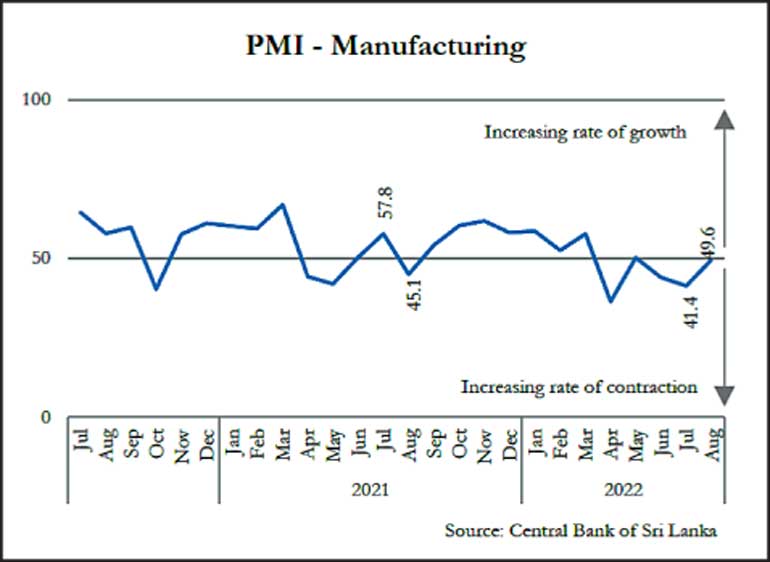Sunday Feb 22, 2026
Sunday Feb 22, 2026
Saturday, 17 September 2022 00:39 - - {{hitsCtrl.values.hits}}


The services sector led the rebound of the economy in August whilst manufacturing too improved, albeit slower as per the Purchasing Managers Index (PMI) compiled by the Central Bank.
“Services PMI returned to growth territory in August, recording an index value of 51.7 after declining for four consecutive months,” CBSL said.
The manufacturing PMI recorded an index value of 49.6 in August, up from July yet slightly below the neutral threshold level.
CBSL said the rate of decline of manufacturing activities was softened with the improvements reported in employment and stock of purchases compared to the previous month while production and new orders declined at a slower pace. Further, the suppliers’ delivery time was shortened with improved mobility.
Overall production and new orders declined marginally in August compared to July. However, considering the largest manufacturing sub-sectors, an increase in production and new orders was reported in the manufacture of textiles and the apparel sector, limiting the overall decline to a marginal level, while the food manufacturing and beverage sector maintained production and new orders at the same level as of July. Many respondents revealed that improved fuel availability on a month-on-month basis positively affected manufacturing activities.
Employment increased in August, particularly in the manufacturing of textiles and apparel sector which frequently suffered from the scarcity of employees. The increase reported in stock of purchases was mainly due to higher activity levels anticipated in the coming months.
Some respondents mentioned that slightly improved foreign exchange availability in the market allows them to open letters of credit to import materials.
Expectations for manufacturing activities for the next three months indicated an improvement in August, for the first time since February, reflecting an improved business sentiment on gradually restoring stability and anticipating a more conducive environment for manufacturing activities in the coming months despite demand side impediments.
CBSL said the rebound in services PMI was driven by the increases observed in new businesses, business activities and expectations for activity.
New businesses expanded in August compared to July, particularly with the improvements observed in financial services, real estate, transportation and other personal activities sub-sectors.
With the increase in mobility amid the easing of the fuel crisis business activities in the services sector increased in August following a continuous decline for four months in a row.
Accordingly, the business activities mainly related to financial services, other personal activities, real estate and insurance sub-sectors showed improvements compared to the previous month. Nevertheless, as highlighted by many respondents, the other supply-side constraints continued to negatively affect the business activities of some subsectors.
In addition, the low demand led by high inflation reportedly weighed on business activities. As such, the wholesale and retail trade sub-sector showed a major decline during the month.
Employment continued to fall in August due to increasing resignations besides a halt in new recruitments and non-renewal of existing employment contracts and retirements. Meanwhile, backlogs of work dropped during the month mainly with the ease of transportation difficulties faced by the staff.
Expectations for business activities for the next three months recovered with renewed expectations of economic stability. Nevertheless, firms express their concerns over import restrictions, increases in taxes and various other uncertainties in the country.